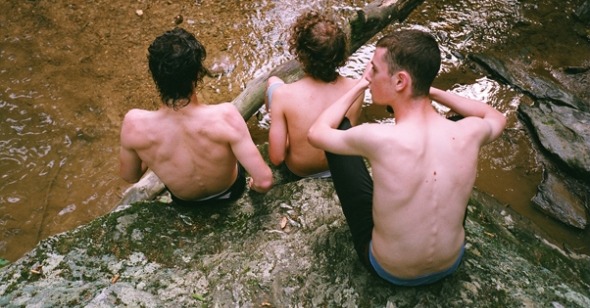Baltimore Son
By Benjamin Mercer
Putty Hill
Dir. Matthew Porterfield, U.S., Cinema Guild
The first time a character utters the word “Baltimore” in Matthew Porterfield’s Putty Hill, it is as an explanation, or rather an excuse, for why a 24-year-old named Cory died of a heroin overdose. “Fucking shit nowadays is killing so many people,” says Cory’s uncle, Spike (Charles Sauers), an ex-con tattoo artist, while methodically inking up a client’s arm. “Baltimore,” sympathizes the client, obviously also a neighborhood acquaintance. Co-writer/director Matthew Porterfield’s second feature (his first was 2006’s Hamilton), a quietly searing portrait of grief and disaffection on the destitute outskirts of that Maryland city, goes on to present a series of discrete slices of life—with these scenes neatly arranged one after another, as if according to some genealogical principle rather than a dramatic one, to show death’s ripple effect through a complex system of friends and relatives—that also cumulatively add up to a portrait of the titular neighborhood. While Putty Hill—which reportedly came together after funding for another project involving much of the same personnel fell through, and underwent a reshoot of a crucial scene late last year on account of a music-rights snafu—is intriguingly structured and shot (by Jeremy Saulnier) in a hypnotically serene overcast palette, its content stubbornly refuses to dovetail with its tone and form.
The movie opens on a paintball range, where Cory’s little brother, James (James Siebor), plays with his older brother’s friends. When James gets “out” of the game and sits down behind a neon-paint-splattered wooden structure, a calm-voiced, quick-talking off-screen interrogator begins to ask him questions. The interviewer gradually segues from querying him about the paintball match at hand to asking him about Cory: “Where do you go when you die?” James squirms a bit and averts his eyes from the camera, but nonetheless answers straightforwardly: “Wherever God decides to put you. That’s not really my question.” These interviews most often take place outdoors, in the overgrown suburb of Putty Hill, and not in the placeless confessional booths or remote rooms where such stitched-into-narrative Q&A’s are traditionally shot. This forces a consideration of these largely twentysomething characters in their open-air environs, which, as the questions grow more personal and the interview subjects more apparently uncomfortable, come to seem more and more like a kind of bell jar.
Porterfield also often captures his largely nonprofessional cast engaged in leisure activities of one form or another, seemingly distracting themselves from the grieving at hand, or at least from contemplating how little they actually knew Cory, identified by his own older sister, Zoe (Zoe Vance), as a hopeless junkie whose death was more or less a foregone conclusion. Groups take walks in the woods, at one point encountering two cops pursuing a bank robber; Cory’s neighbor, Geoff (Drew Harris), treads water in his backyard pool; Cody (Cody Ray), whose brother Dustin befriended Cody in jail, takes a smoke break at a skate park; the grandmother of the deceased, Virginia (Virginia Heath), forestalls consoling her daughter by staring at the TV and talking about how much she likes Reba McEntire. The movie’s dramatic high point, such as it were, is an almost festive memorial gathering at a karaoke bar. Jenny (Sky Ferreira), Cory’s cousin and the estranged daughter of the tattoo artist, belts out a heartfelt version of Dolly Parton-by-way-of-Whitney Houston ballad “I Will Always Love You.” Karaoke also serves as a nice metaphor for the rehearsed public aspect of grief. Many confused younger characters wonder aloud whether they are “supposed to” cry or wear black at Cory’s funeral, as if they expect to receive their actions and feelings from some sort of prompt.
If Putty Hill is, indeed, another example of American-independent regionalism—instantly recognizable by its suffocating deterministic atmospheres and its oversimplified character typologies, which often don’t seem to allow for a middle ground between the jaw-droppingly foulmouthed and the stoically tight-lipped—its by-degrees approach proves intriguingly novel. This is not a film that immerses you, in medias res, in a hardscrabble milieu, but rather one that slowly wades deeper and deeper into its setting, more interested in drawing connections among its characters than it is in mounting a full-scale social critique. For this reason, Putty Hill ultimately has more in common with elusive, meticulously textured auteurist works like Gus Van Sant’s Portland-youth-in-tumult films Elephant (which, like Porterfield’s film, orbits around an absence) and Paranoid Park (another skate-kid collage piece). In its observation of daily life running limply, desperately, weirdly apace in the wake of a death in the family, Porterfield’s film also recalls Fernando Eimbcke’s more cohesive, sophomore film, Lake Tahoe. Putty Hill’s characters seem loath to do anything that’s not designed to offer a reprieve from everyday drudgery—“I like to cook, but not that much,” says Virginia as she leads Jenny down to her retirement-home cafeteria—but perhaps the movie could have benefited from some of the decisive yet still deflated day-to-day actions on display in Lake Tahoe, not to mention that film’s grim sense of humor.
The mood of Putty Hill is vividly oppressive, and the form of the film unfailingly interesting, if not wholly successful—but the whole ultimately feels too aimless and opaque. Cory’s death seems intended to serve as a window into the inner lives of these characters and the city they’re from, but these characters’ resistance to self-reflection and the scrutiny of others makes that window more of a mirror, constantly reflecting back the sad fact of a young man’s untimely demise. Perhaps that’s the point—that there’s no lesson in this boy’s death, that this kind of thing simply comes with the territory, and that this is a fact these people have all reluctantly come to accept. But the film’s one-by-one examination of individuals would also seem to discourage such a broad reading. Putty Hill is admirable for its poise and ambition, but considering its whys and wherefores is kind of like getting lost in the woods.
